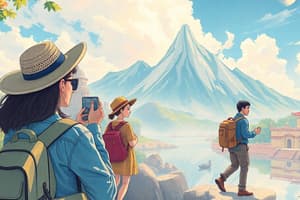Podcast
Questions and Answers
How can travel contribute to economic growth in a destination?
How can travel contribute to economic growth in a destination?
- By solely focusing on large-scale tourism projects that do not benefit local communities.
- By decreasing the demand for local goods and services, leading to business closures.
- By increasing economic activity through job creation and revenue generation. (correct)
- By raising the cost of crucial infrastructure like roads, healthcare, and education.
What role might a tour guide play that goes beyond the typical expectations?
What role might a tour guide play that goes beyond the typical expectations?
- Discouraging interaction between tourists and the local community to preserve cultural authenticity.
- Advocating for local community causes and facilitating cultural exchange between tourists and locals. (correct)
- Focusing solely on maximizing profits from tourist activities, regardless of the impact on the local culture or people.
- Providing only basic historical facts to minimize information overload for tourists.
How can travel lead to improved infrastructure and services in a destination?
How can travel lead to improved infrastructure and services in a destination?
- Travel can lead to improved infrastructure and services, such as better roads, healthcare facilities, and education. (correct)
- Travel can lead to reduced investment in local infrastructure as resources are diverted to tourist-specific amenities.
- Travel encourages policymakers to prioritize short-term profits from tourism over long-term infrastructure development.
- Travel decreases the incentives for governments to improve public services due to reliance on private tourism sectors.
In what ways can travel negatively impact the environment?
In what ways can travel negatively impact the environment?
A tour guide with specialized expertise is LEAST likely do what?
A tour guide with specialized expertise is LEAST likely do what?
A tour guide significantly enhances a destination's image by:
A tour guide significantly enhances a destination's image by:
Which of the following is typically NOT a component of a formal tour guide training course?
Which of the following is typically NOT a component of a formal tour guide training course?
Renewal of a tour guide license often requires continuing education courses to:
Renewal of a tour guide license often requires continuing education courses to:
A 'Working Towards Change' tour guide differentiates themselves by:
A 'Working Towards Change' tour guide differentiates themselves by:
Which specialization would be MOST suited for a tour guide with extensive knowledge of local vineyards and wineries?
Which specialization would be MOST suited for a tour guide with extensive knowledge of local vineyards and wineries?
A tour guide dramatically adjusts their itinerary mid-tour because they realize the group is exceptionally interested in local culinary practices, even though it wasn't originally a focus. Which guiding approach does this best exemplify?
A tour guide dramatically adjusts their itinerary mid-tour because they realize the group is exceptionally interested in local culinary practices, even though it wasn't originally a focus. Which guiding approach does this best exemplify?
Which of the following actions by a tour guide best demonstrates the application of 'scaffolding' in a learning context?
Which of the following actions by a tour guide best demonstrates the application of 'scaffolding' in a learning context?
A historical tour guide uses primary source documents and encourages tour participants to debate different interpretations of historical events. This approach most closely aligns with which learning theory?
A historical tour guide uses primary source documents and encourages tour participants to debate different interpretations of historical events. This approach most closely aligns with which learning theory?
A nature guide wants to educate tourists. According to social learning theory, which strategy would be MOST effective?
A nature guide wants to educate tourists. According to social learning theory, which strategy would be MOST effective?
A culinary tour guide breaks down the steps of a complicated recipe into smaller, more manageable parts, and then uses a diagram to show how the ingredients interact. Which learning model best describes this approach?
A culinary tour guide breaks down the steps of a complicated recipe into smaller, more manageable parts, and then uses a diagram to show how the ingredients interact. Which learning model best describes this approach?
Which of the following scenarios exemplifies the importance of regular assessment in tour guide education?
Which of the following scenarios exemplifies the importance of regular assessment in tour guide education?
A tour guide is leading a group through a religious site. Which action demonstrates cultural sensitivity?
A tour guide is leading a group through a religious site. Which action demonstrates cultural sensitivity?
A tour guide is struggling to keep visitors engaged during a walking tour. Which of the following strategies would be MOST effective in improving guest engagement?
A tour guide is struggling to keep visitors engaged during a walking tour. Which of the following strategies would be MOST effective in improving guest engagement?
A new tour guide is unsure about the accuracy of some information they found online regarding a local historical event. What is the MOST appropriate course of action?
A new tour guide is unsure about the accuracy of some information they found online regarding a local historical event. What is the MOST appropriate course of action?
A tour guide notices a potential safety hazard along the tour route (uneven pavement). What is the MOST appropriate immediate action?
A tour guide notices a potential safety hazard along the tour route (uneven pavement). What is the MOST appropriate immediate action?
Flashcards
Economic Growth (Travel)
Economic Growth (Travel)
Travel boosts economic activity, creating jobs, increasing revenue, and alleviating poverty in the destination.
Cultural Exchange (Travel)
Cultural Exchange (Travel)
Travel promotes understanding between cultures and fosters global awareness.
Environmental Impact (Travel)
Environmental Impact (Travel)
Travel can strain resources, causing pollution, deforestation, and water shortages.
Guide's Unusual Role
Guide's Unusual Role
Signup and view all the flashcards
Deep Local Knowledge
Deep Local Knowledge
Signup and view all the flashcards
Adaptive Approach
Adaptive Approach
Signup and view all the flashcards
Understanding the Learner
Understanding the Learner
Signup and view all the flashcards
Scaffolding
Scaffolding
Signup and view all the flashcards
Chunking Information
Chunking Information
Signup and view all the flashcards
Active Learning
Active Learning
Signup and view all the flashcards
Assessment
Assessment
Signup and view all the flashcards
Ethical considerations
Ethical considerations
Signup and view all the flashcards
Educating the Tour Guide
Educating the Tour Guide
Signup and view all the flashcards
Enhances visitor experience
Enhances visitor experience
Signup and view all the flashcards
Cultural Understanding
Cultural Understanding
Signup and view all the flashcards
Destination Image
Destination Image
Signup and view all the flashcards
Tour Guide Training Programs
Tour Guide Training Programs
Signup and view all the flashcards
Tour Guide Examination
Tour Guide Examination
Signup and view all the flashcards
"Working Towards Change" Guide
"Working Towards Change" Guide
Signup and view all the flashcards
Study Notes
- Travel can have economic, social, and environmental impacts
Economic Impacts
- Tourism can stimulate economic activity, leading to job creation
- Increased revenue and reduced poverty can be possible
- Tourism leads to improved infrastructure like better roads, healthcare, and education
Social Impacts
- Travel encourages global awareness and cross-cultural understanding
- Travel helps alleviate social inequality and promote food sovereignty
- Travel helps people connect with a destination on a deeper level through new experiences
Environmental Impacts
- Travel has the potential to negatively impact the environment, especially in wildlife areas
- In dryer regions it can lead to water shortages and degradation of water supplies
- Travel can have both positive and negative health outcomes for local people
Guide's Role Beyond Expectations
- A "Guide's unusual role" refers to situations where tour guides go beyond providing information such as:
- Acting as a cultural interpreter
- Being a local community advocate
- Wildlife conservation educator
- Temporary translator
- The guide becomes a deeply involved facilitator
Key Points About a Guide's Unusual Role
- Some guides offer deep local knowledge by sharing intimate details about customs not commonly known
- Others connect tourists with local people, businesses, or initiatives
- Some guides focus on wildlife observation, historical reenactments, or culinary exploration
- Some guides weave narratives that connect the tour to individual guests' interests
Adaptive Approach
- Some guides adjust tours based on the group's needs and interests for a dynamic experience
Examples of Unusual Guide Roles
- Historical guide leads battlefield reenactments and encourages participants to dress in period attire
- A nature guide uses tracking skills to spot rare wildlife and educates guests about conservation efforts
- A culinary tour guide takes visitors to local markets and teaches them to cook traditional dishes
- A community-based guide leads tours through marginalized neighborhoods with local art and music
Applying Learning Theories to Guiding
- Identify the learner's current knowledge level, preferred learning style, and motivations to guide tour activities.
- Define specific, measurable learning objectives to guide the direction of your guidance and track progress.
- Provide structured support and progressively decrease assistance as the learner gains confidence and competence.
Applying Learning Theories to Guiding Examples
- Positive reinforcement: Guide offers praise and rewards for desired behaviors or correct responses
- Feedback loop: Guide provides immediate feedback on performance to guide improvement
- Chunking information: Breaking down complex concepts into smaller, manageable pieces for easier absorption
- Visual aids: Guide utilizes diagrams, graphs, and other visual representations to support understanding
- Active learning: Guide encourages learners to actively engage with the material through discussion and exploration
- Connect to prior knowledge: Guide helps learners link new information to their existing understanding
- Collaboration: Guide facilitates group work and peer learning to promote knowledge sharing
- Modelling: Guide demonstrates desired behaviors and skills to guide learning through observation
Applying Learning Theories Considerations
- Be flexible: Adapt your guidance approach based on the learner's individual needs and context
- Assess the effectiveness of the tour: monitor progress to adjust where needed
- Be ethical: Ensure your guidance is inclusive, and promotes learner autonomy
Educating The Tour Guide
- Equipping a tour guide with the knowledge and details about a specific location
Key Aspects of Educating a Tour Guide:
- Deep local knowledge requires a thorough understanding of the history, geography, customs, traditions, and landmarks
- Factual accuracy means the tour guide has correct information about dates, events, and people
- Cultural sensitivity ensures training the guide to be respectful of local customs, beliefs, and practices
- Storytelling skills develop the ability to weave information into interesting and memorable narratives
- Guest engagement means teachings techniques to actively involve visitors, answer questions, and cater to diverse interests
- Logistics and safety procedures ensure guides have knowledge about transportation, accessibility, and emergency protocols
Methods for Educating a Tour Guide
- Guides use the learning materials and work with experienced tour guides, historians, cultural specialists, and local community leaders
- They use the information for on-site familiarization
Why Educating the Tour Guide is Important
- Improves the visitors experience with richer, more engaging tours
- Promotes cultural understanding, using effective communication of customs and perspectives
- Improves destination image, because the destination gains a reputation for quality
Licensing and Certification
- Licensure involves completing a recognized tour guide training program.
- There is a required examination, certification to legally operate as a tour guide
Key Points About Tour Guide Certification
- Regions require tour guide training with formal courses, which include; local history, culture and tourism regulations.
- People sit for a practical exam to demonstrate competency
- Certification is typically issued by the government agency
- Licenses need to be renewed periodically, staying updated on tourism trends
Common Documents Required For Tour Guide Licensing:
- Completed application form needed for the application process
- Proof of a completed tour guide program is needed to prove tour-guide competency
- Individuals need to pass an examination to prove tour-guide competency
- Individuals will require to have a valid government issued ID
- A recent passport sized photo is needed for the application process
- An applicant needs to be have a valid health certificate, proving they are fit for the occupation
- A police clearance certificate is a requirement for most tour-guide certifications
Tour Guide Specializations:
- Cultural heritage guides focus on historical sites and cultural practices
- Nature guides have expertise in natural environments, wildlife, and eco-tourism
- Adventure guides lead activities like hiking and kayaking
- Food and wine tour guide focus on local cuisine and beverage experiences
Working Towards Change Tour Guide
- They research and integrate information about local challenges like pollution, poverty, cultural preservation
- They partner with organizations or businesses that work towards positive change
- The guide emphasizes respect for local customs and traditions; while ensuring visitors avoid stereotypes
- Beyond information, the guide encourages tourist participation in small acts of positive change, such as supporting local businesses
Examples of a "Working Towards Change" Tour Guide
- In a historical city the guide will highlight the challenges faced by marginalized communities
- In a natural environment they will educate visitors to threats of endangered species
- In rural area the guide will share information about local farming practices
Benefits OF A Change Tourism Guide
- Tourist gain a deeper understanding of a situation
- Positive impact on the community
- Guide has an opportunity to advocate
Education for Tour Guides
- They need to complete a tourism-related course, often including local history, geography, culture, and language
- They will then need to get a License by passing an exam
Key Points Regarding Tour Guide Education:
- Courses will cover; local history, cultural landmarks, tourism regulations, and customer service
- Training is conducted across various levels of tourism training centres
- Regions will require individuals to sit through a practical exam to be certified
- Tour guides can expand their certifications to specialised versions
Skills for a Tour Guide
- Strong communication
- In-depth local knowledge
- Organizational skills
- Customer service skills
Tour Guide Curriculum in the Philippines
- It focuses on researching information, managing visitor arrangement
- The TESDA curriculum covers:
- Researching information relevant to the tour
- Managing arrangements for visitors
- Accompanying and guiding visitors according to itinerary
Philippines Tour Guiding - Skills Covered:
- Interpreting of symbols, directing layouts
- Explaining procedures
- Confirming schedules
- Handling pre-arrival activities
- Complaint resolution
Aspects to Consider when Tour Guiding in the Philippines:
- A professional tour guide is accredited with the Department of Tourism
- There are specializations to choose like guiding for nature and touring for cultural and historical sites
- Language proficiency is an essential skill, proficiency in English and potentially additional languages
The Mabuhay Guide Program in the Philippines
- Created to assist top quality guides catering to business travelers
- Out of 50 applicant's only 25 were chosen to take the course
- 21 trainees were successful
Tour Professional - Steps to Selection:
-Tour guides complete a screening panel interview -They undertake 6 weeks of lecture and actual training -Graduation
Classification of Tours According to Movement:
- Domestic: Travel within the nation
- Inbound: Tours who conduct tours of foreign nationals
- Outbound: Tours that take national abroad
Tour Professional: Roles:
- Tour Guide: Leads tours and gives professional advice and support to tourists
- Tour Coordinator: Manages accommodation and transportation
- Tour Escort: Employed as a professional by the travel agency to assist the guest
- Travel Agent: Solves travel-related issues on behalf of guests
Tour Guide - Character Traits:
-Accepts authority -Attentive and Focused -Candid -Caring -Cheerful -Conclusive -Confident -Considerate -Dedicated -Dependable -Dynamic -Friendly -Modest -Motivated
- Polite -Prompt
Studying That Suits You
Use AI to generate personalized quizzes and flashcards to suit your learning preferences.




